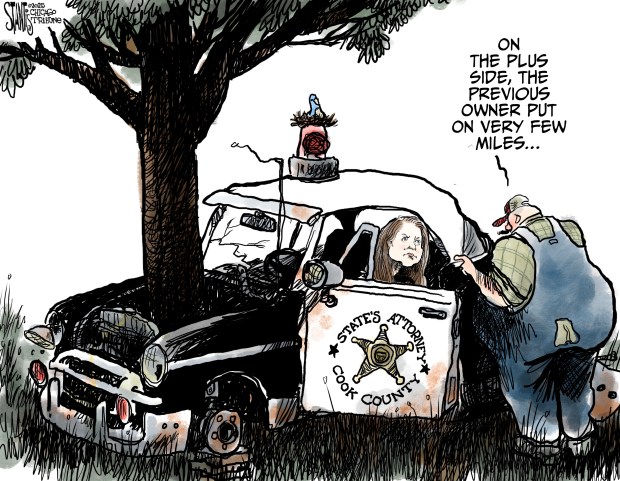After city Inspector General Deborah Witzburg complained publicly last month about City Hall interference with her investigations, the city’s top lawyer countered with a rebuke.
Corporation Counsel Mary Richardson-Lowry at a news conference said requirements for timely compliance with records requests would remove “30 years of guardrails” that protect city workers. City lawyers need to sit in on the IG’s investigative interviews of city workers, Richardson-Lowry claimed, because an attorney-client relationship exists between the workers and the city’s Law Department.
Well, not so fast.
The policy arm of my organization, the Better Government Association, issued a statement by our outside counsel, who found no legal merit in Richardson-Lowry’s claims. And former Gov. Pat Quinn has drafted a petition to address the corporation counsel’s conflict of interest — by making the corporation counsel an elected office and no longer a tool of Chicago’s mayor.
Quinn’s petition, to put an advisory referendum on voters’ ballots, seems well intended. But petitions too often are ineffective, performative and piecemeal tools of reform. There needs to be a better way.
In fact, there is, and it’s called a city charter. One might ask: A city what? But bear with me, dear reader, and you may see the wisdom in this wonkish but powerful idea.
A city charter is, in essence, a constitutional document for a municipality. Chicago does not have one. Two key peer cities — New York and Los Angeles — do. Hundreds of other cities, too.
Charters are hardly a cure-all for urban ills. But they can reboot the rules by which a city is governed — which in a place such as corruption-ridden Chicago, could be a welcome change.
A charter could cut the size of the City Council. It could better define the independent legislative powers of the council too. It could more effectively require disclosure and review of major city contracts.
Those are some of the textbook arguments. In the grit and sweat of the city’s work, a charter might prevent debacles such as the city’s giveaway of its parking meters, or even the midnight destruction of Meigs Field. It might allow recall votes for ineffective mayors. It could even forbid an alderman from running a law firm that specializes in real estate appeals.
The list goes on — almost as far as the good-government imagination might run. The trouble is, if normal politics are the art of the possible, then the politics of a charter campaign might fairly be described as the art of the nearly impossible.
Action by the state legislature would be an important first step. But downstate lawmakers would have little incentive to back the idea. Even the Chicago caucus likely would be split on the issue.
Even so, the upside benefits are potentially powerful enough that a push for a Chicago city charter could be worth the effort, regardless of the odds.
In fact, the notion of a charter for Chicago is having a moment of sorts. The boomlet can be traced to a book, “The New Chicago Way,” published six years ago, in which authors Austin Berg and Ed Bachrach held up Chicago in woeful comparison to 14 other U.S. cities. Our history of strongman mayors; nearly bankrupt public schools; fiscal and pension problems; rising violent crime; and other urban ills are in some ways linked to the lack of a city charter for Chicago, they argued.
The idea was big and also abstract. But instead of dying on a bookshelf, it improbably caught on — in a slow-smolder sort of way.
One effort that could use a dose of oxygen is the push by state Rep. Kam Buckner to secure a vote for the state legislature to launch the charter process — the most direct path toward that end under state law.
Buckner made the charter idea a centerpiece of his 2023 mayoral campaign — and got 2% of the primary vote. Undeterred, Buckner has introduced a bill in Springfield to create a broadly diverse charter commission.
Kam Buckner: A city charter is the reform Chicago actually needs, not recall powers
Details are still in flux, but Buckner envisions an elected commission. Public officials would not be eligible, and ideally the seats would be filled with people from all walks: labor, business, neighborhood-based organizations and good-government groups; and people with expertise in municipal finance, constitutional law, zoning, data and democracy.
The charter movement has attracted some odd political bedfellows. Quinn, one of the most progressive governors in state history, unveiled his petition this week at a charter-focused forum sponsored by the conservative Illinois Policy Institute. Several Chicago aldermen showed up, too — including Ald. Gilbert Villegas, 36th, who has called for a charter from the floor of the City Council.
Legislative action will happen slowly, if at all. Inertia is hard to overcome. And those who benefit from the status quo won’t let go easily. The charter is an abstract issue, and proponents have a difficult time making it viscerally meaningful to voters.
Buckner figures the process could take a decade, all the more reason he argues the work needs to start now. And even downstate lawmakers eventually will back the idea, Buckner argues, because the state benefits when Chicago is strong and stable.
“This is big. It’s difficult. It’s bold,” Buckner told me. “Let me remind people: We’re Chicago. If people want to do it, we can put our minds together and do it right.”
But a decade is too long to wait for reforms that are needed now. The City Council has it within its powers to take actions that would accomplish what a charter might. In fact, those protections the city IG is seeking against City Hall interference would be one place to start.
In Chicago, it’s never too soon to begin making government better.
David Greising is president and CEO of the Better Government Association.
Submit a letter, of no more than 400 words, to the editor here or email letters@chicagotribune.com.



